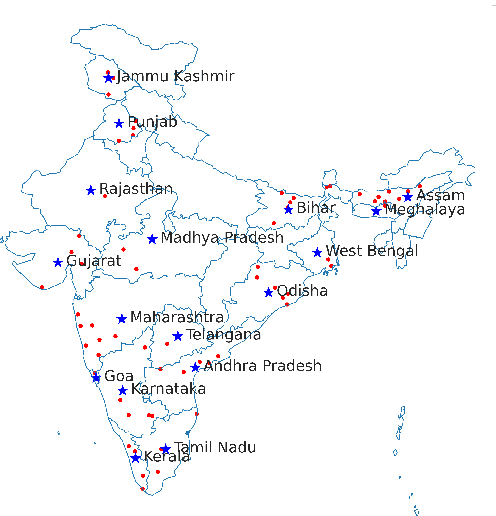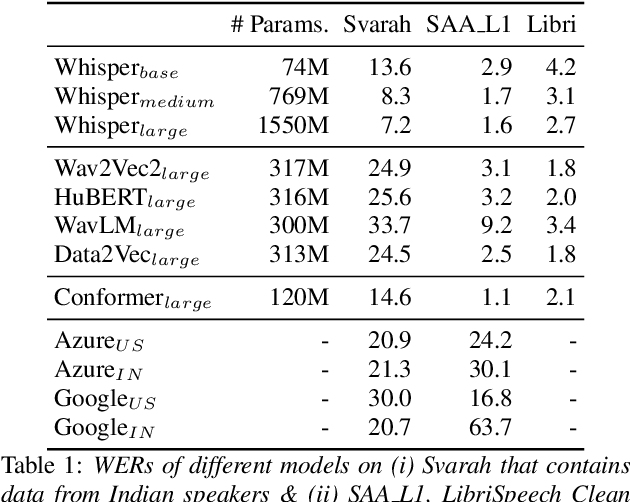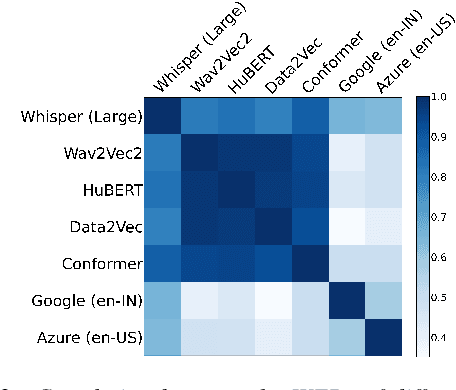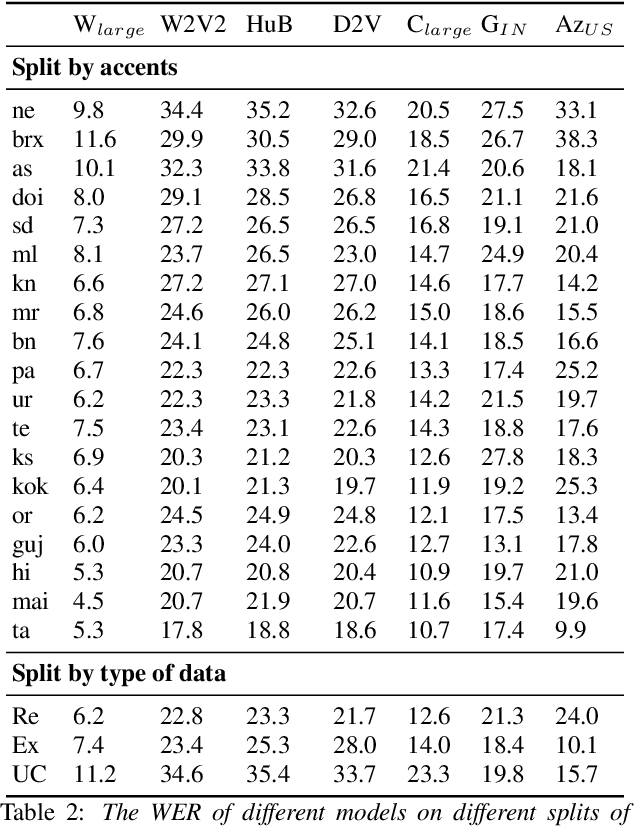Sakshi Joshi
Recognizing Every Voice: Towards Inclusive ASR for Rural Bhojpuri Women
Jun 11, 2025Abstract:Digital inclusion remains a challenge for marginalized communities, especially rural women in low-resource language regions like Bhojpuri. Voice-based access to agricultural services, financial transactions, government schemes, and healthcare is vital for their empowerment, yet existing ASR systems for this group remain largely untested. To address this gap, we create SRUTI ,a benchmark consisting of rural Bhojpuri women speakers. Evaluation of current ASR models on SRUTI shows poor performance due to data scarcity, which is difficult to overcome due to social and cultural barriers that hinder large-scale data collection. To overcome this, we propose generating synthetic speech using just 25-30 seconds of audio per speaker from approximately 100 rural women. Augmenting existing datasets with this synthetic data achieves an improvement of 4.7 WER, providing a scalable, minimally intrusive solution to enhance ASR and promote digital inclusion in low-resource language.
LAHAJA: A Robust Multi-accent Benchmark for Evaluating Hindi ASR Systems
Aug 21, 2024



Abstract:Hindi, one of the most spoken language of India, exhibits a diverse array of accents due to its usage among individuals from diverse linguistic origins. To enable a robust evaluation of Hindi ASR systems on multiple accents, we create a benchmark, LAHAJA, which contains read and extempore speech on a diverse set of topics and use cases, with a total of 12.5 hours of Hindi audio, sourced from 132 speakers spanning 83 districts of India. We evaluate existing open-source and commercial models on LAHAJA and find their performance to be poor. We then train models using different datasets and find that our model trained on multilingual data with good speaker diversity outperforms existing models by a significant margin. We also present a fine-grained analysis which shows that the performance declines for speakers from North-East and South India, especially with content heavy in named entities and specialized terminology.
IndicVoices: Towards building an Inclusive Multilingual Speech Dataset for Indian Languages
Mar 04, 2024Abstract:We present INDICVOICES, a dataset of natural and spontaneous speech containing a total of 7348 hours of read (9%), extempore (74%) and conversational (17%) audio from 16237 speakers covering 145 Indian districts and 22 languages. Of these 7348 hours, 1639 hours have already been transcribed, with a median of 73 hours per language. Through this paper, we share our journey of capturing the cultural, linguistic and demographic diversity of India to create a one-of-its-kind inclusive and representative dataset. More specifically, we share an open-source blueprint for data collection at scale comprising of standardised protocols, centralised tools, a repository of engaging questions, prompts and conversation scenarios spanning multiple domains and topics of interest, quality control mechanisms, comprehensive transcription guidelines and transcription tools. We hope that this open source blueprint will serve as a comprehensive starter kit for data collection efforts in other multilingual regions of the world. Using INDICVOICES, we build IndicASR, the first ASR model to support all the 22 languages listed in the 8th schedule of the Constitution of India. All the data, tools, guidelines, models and other materials developed as a part of this work will be made publicly available
Svarah: Evaluating English ASR Systems on Indian Accents
May 25, 2023



Abstract:India is the second largest English-speaking country in the world with a speaker base of roughly 130 million. Thus, it is imperative that automatic speech recognition (ASR) systems for English should be evaluated on Indian accents. Unfortunately, Indian speakers find a very poor representation in existing English ASR benchmarks such as LibriSpeech, Switchboard, Speech Accent Archive, etc. In this work, we address this gap by creating Svarah, a benchmark that contains 9.6 hours of transcribed English audio from 117 speakers across 65 geographic locations throughout India, resulting in a diverse range of accents. Svarah comprises both read speech and spontaneous conversational data, covering various domains, such as history, culture, tourism, etc., ensuring a diverse vocabulary. We evaluate 6 open source ASR models and 2 commercial ASR systems on Svarah and show that there is clear scope for improvement on Indian accents. Svarah as well as all our code will be publicly available.
 Add to Chrome
Add to Chrome Add to Firefox
Add to Firefox Add to Edge
Add to Edge